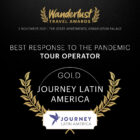Group - Discovery
Coq of the Rock: Trailblazing the Guianas
16 days from £4,800pp
(based on two people sharing & excluding flights)
Essentials
-
Tour info
-
Country info
-
What's included
Tour info
Nature Of The Trip
The Coq of the Rock Journey is guaranteed to be a thrilling off-the-beaten track adventure, and will take you to places where very few other tourists visit. However, it’s important from the outset to be fully aware of the nature of the trip.
Although we’ve run the trip more than a dozen times, transport; accommodation and infrastructure do still present a number of practical difficulties. Things do go wrong; short bus rides will turn into marathons; border crossings and immigration bureaucracy will frustrate. Air and land transport is intended for local people, who often don’t have the rigid timetables we are accustomed to live by in our world.
On top of this, it is hot and some of the days have early starts and long days of travel, so there will be some tiring days, but this is part of the nature of travel in such an undeveloped region. Accommodation is no frills in some areas, and ‘day-to-day’ itineraries do occasionally have to be seen as a guide to intentions rather than cast-iron promises of what the future holds: the best example of this being the European Space Centre, which we aim to visit on every trip, though in the event of a launch schedules can change at a moment’s notice, and are completely beyond our control.
We’ve considered making the trip more comfortable, however we feel that by doing so we risk losing some of what makes the trip memorable: that heady mix of excitement and adventure in visiting an area so few get to experience. If you don’t relish that, please don’t book this trip.
Tour Leader
On this tour, you’ll be accompanied from start to finish by one of our exceptional Journey Latin America tour leaders. From the moment you land in Latin America until the day the tour ends they will deal with all the practicalities, expertly adapting to the circumstances and individual needs of the group. Rather than different guides in different cities, your leader will get to know the group and keep you informed and entertained as you go.
About Our Group Tours
To find out more about how our group tours including group sizes, solo travellers and why to choose us. Please click here.
Travelling Alone
There is no extra cost for single travellers who are willing to share a room. You will be accommodated with another same-sex member of the group who is also travelling solo. For single travellers who wish to have their own room there are a limited number of single rooms available, which carry a surcharge but you may be asked to share for a few nights when the accommodation is particularly restricted.
Transport
2 flights; 5 land journeys (longest 13 hrs but this includes one of the ferries and the border formalities); 2 sea crossings; 2 river ferries.
Accommodation
For this tour we aim to use good quality, value-for-money accommodation, in a mix of larger more modern, smaller family run hotels and lodges. All the properties we use are well maintained and rooms will have a private bathroom.
The focus of these trips is on getting outside, seeing the sights, and experiencing local restaurants and cafes, therefore a few hotels may not have evening dining facilities.
• Rio de Janeiro: Americas Benidorm
• Boa Vista: Hotel Uiramutam
• Guyanese Interior: Rock View and Atta Lodge
• Georgetown: El Dorado Inn
• Paramaribo: Eco Torarica
• Kourou: Hotel Atlantis
• Cayenne: Hotel Amazonia
These hotels are subject to change and are dependent on availability. Address and contact details will be sent out with your final documents.
Meals
Breakfast daily; full board days 4,5,6 and 7.
Summary Of Nights
16 days, 15 nights: Rio de Janeiro 2, Boa Vista 1, Atta rainforest 2, Rock View 2, Georgetown 2, Paramaribo 3, Kourou 2, Cayenne 1.
Optional Excursions
Due to the nature of this tour there are a only a handful of optional excursions available.
Money
Take cash in US$ (and for French Guiana, euros) up to the total limit your insurance will allow. Travellers’ cheques are difficult to cash. ATMs which give access to cash are available in cities, but it’s worth having plastic for both Visa and Mastercard. Tell your bank in advance where and when you’re going. We recommend a daily budget of $35-40 USD per person per day to cover the cost of meals and daily expenses including tips and taxes.
Visas
British passport holders (and almost all others) will need an e-visa for Suriname. We will send details of how to apply nearer the date of travel.
Holders of a full British passport do not require a visa for the other countries, although passports must be valid for at least 6 months after the trip begins. Clients with a different nationality enquire or check with the relevant consulate.
APIS and ESTA – important flight information:
ESTA – if flying to the US, or via the US you will need to fill in your application to ESTA online.
This costs $14 per person. This must be done by you personally.
Passports must also be machine-readable (MRP). Avoid locking suitcases if transiting the USA, as their customs authorities retain the right to break into them.
APIS – Many countries now oblige airlines to provide additional information about passengers prior to the flight departure. This Advance Passenger Information (APIS) must be supplied to us promptly in order to issue tickets and avoid fare increases. We will provide the airlines with the relevant details if we are booking your international flights. If the information is not provided you may be denied boarding.
Insurance
Travel insurance is essential. Details of our recommended policy can be found on our Travel Insurance page.
Climate
The Journey enters 4 countries, but we travel within a fairly thin band between 10 and 5 degrees N of the equator. So it’s tropical, i.e. hot and humid throughout. Along the Caribbean coasts of Guyana, Suriname and French Guiana, October is statistically one of the driest months in the year.
Cayenne’s annual rainfall is over 3,600mm, but October’s is 74mm – i.e. only 1/60 of the yearly total. But it’s all tropical – it can rain anytime, often in short and very heavy bursts.
Vaccinations
Preventative jabs or tablets are recommended for: malaria, typhoid, polio, tuberculosis, tetanus and hepatitis A. Consult your local GP, or health clinic – he or she will probably refer you to the NHS fitfortravel website.
Take precautions against being bitten -by applying insect repellent, especially in the evenings out of cities. A valid yellow fever certificate or official doctor’s note stating why you cannot be vaccinated must be produced when crossing some borders, so it is essential that these are carried. There are several brands of gel or foam which can be used for washing your hands where no clean water is available.
Clothing And Special Equipment
Clothing should be casual and comfortable – plenty of light cotton (or light-weight wicking fabric which controls perspiration and dries quickly). Light colours are beneficial against sun and bugs. Dark clothes attract mosquitoes.
For wildlife viewing, the best colours to wear are pastel tones, like brown, beige and green, which don’t highlight your silhouette in the landscape and camouflage you in foliage. Avoid strong colours like yellow, bright blue and red.
Shorts and short-sleeve shirts should be avoided in the evenings, especially away from cities. Air-conditioning in rooms and restaurants is the closest you’ll get to being cold, so a light sweater or “layers” will suffice.
Other items worth packing are: Swim suit and towel, sun hat, trainers, lightweight raincoat, Insect repellent, sun tan lotion, sunglasses and torch.
For some excursions to the jungle and/or local flights you may be restricted to a maximum baggage allowance of 10kg (owing to limited space on light aircraft). In addition, some of the mini buses we use have limited baggage space.
A backpack or soft holdall (ideally with some degree of waterproofing) is the most comfortable way to carry your belongings, along with a small day-use backpack (25-40l capacity).
Country info
When's the best time to visit Brazil?
Brazil is an all-year destination, but it’s a vast country: when you go will depend on your chosen itinerary and interests. Late Dec-Mar are the hottest months – very hot (over 40°C) from Rio northwards – and the local holiday season, so attractions can be very busy. During the Amazon’s wet season (Jan - Jun) it’s easier to get round by boat, the dry season is sunnier and better for wildlife-spotting but very hot. The Pantanal may be best avoided during the wettest months (Nov - Mar) when there are many mosquitoes. However this is the best time to visit the beaches of the south where it’s cool outside this period.
For more detailed information visit our When To Go section.
What's the official language of Brazil?
The official language of Brazil is Brazilian Portuguese; a more languid and musical version of Portugal's mother tongue. You will also find indigenous languages spoken in Amazonia.
How do I get local currency in Brazil?
The local currency in Brazil is the Brazilian Real. Notes can be withdrawn from the many ATMs at airports and in larger towns and cities. Limits may be lower than your UK bank allows. Banco do Brasil, HSBC accept UK credit or debit cards allowing daily withdrawals of 1,000reais. Bradesco allows a lower limit. Other banks eg Banco 24horas do not accept foreign cards. Most towns have a Banco do Brasil. ATMs close at 10pm. Currency is also obtainable in banks and money exchanges.
What is the time difference between Brazil and UK?
The time difference between the UK and Brazil is GMT -3 hours. There is daylight saving from Oct- end Feb (approx) when clocks are put forward one hour.
Do I need a visa for Brazil?
Holders of a full British passport do not require a visa, although passports must be valid for at least 6 months after the trip begins. Anyone with a different nationality should enquire with us or check with the relevant consulate.
If flying to the US, or via the US you will need to fill in your online ESTA application.
What vaccinations do I need for Brazil?
Please check Travel Health Pro for information on health recommendations and vaccinations for the destinations you are visiting. Please note that many Latin American countries require proof of vaccination against Yellow Fever if you have recently travelled to another country where Yellow Fever is present.
What are the festivals, cultural and sport events in Brazil?
Carnival offers 5 days of celebration in Feb/Mar. Live bands, costume balls, over-indulgence and general frivolity will take place in towns and cities all over the country. The best parades are in Rio, Salvador and Olinda.
Which countries combine well with Brazil?
Argentina: The crossing at Iguazú Falls is convenient for many visitors.
Peru: There is a direct flight from Lima to Rio de Janeiro (5 hours) and to São Paulo (4-5 hours with many connections to other cities).
When is the best time to visit Guyana?
The climate in Guyana is typically hot with average daily temperatures of 27oC and it stays warm throughout the night. The north of the country experiences two wet seasons – May-Jun and Dec-Feb. The south and the Rupununi has only one wet season, May-Aug. The best months to visit for wildlife viewing and exploring the interior are Feb-Apr and Oct-Dec.
For more detailed information visit our When To Go section.
What is the official language of Guyana?
The official language of Guyana is English.
What is Guyana's official currency?
The official currency of Guyana is the Guyanese dollar. Notes can be withdrawn from ATM at the Scotia bank in Georgetown (protect your PIN number) using a UK credit or debit card. Some other banks will offer advances on a credit card. Otherwise you can change cash at hotels and money exchanges. Never change money on the street. Guyana is largely a cash economy though credit cards are accepted in some establishments used by tourists.
What is the time difference between the UK and Guyana?
The time difference between the UK and Guyana is GMT-4 hours.
Do I need a visa for Guyana?
Holders of a full British passport do not require a visa, although passports must be valid for at least 6 months after the trip begins. Anyone with a different nationality should enquire with us or check with the relevant consulate. If flying to the US, or via the US you will need to fill in your online ESTA application.
What vaccinations do I need for Guyana?
Please check Travel Health Pro for information on health recommendations and vaccinations for the destinations you are visiting. Please note that many Latin American countries require proof of vaccination against Yellow Fever if you have recently travelled to another country where Yellow Fever is present.
Which countries combine well with Guyana?
A visit to the two other Guianas, which sit east of Guyana along the coast: Suriname, colonised by the Dutch, and Guyane, still a French overseas département. It’s not easy to do independently: we recommend you join our annual small group guided tour, named Coq of the Rock.
What are the festivals, cultural and sporting events in Guyana?
The religious festivals of all the main religions represented by the population are celebrated, Christian Christmas and Easter; Hindu Diwali; Muslim Eid al-Adha and Amerindian Mashramani.
When is the best time to visit French Guiana?
Temperatures are tropical and consistent, averaging 27°C throughout the year, although it can be cooler at night in the highlands than on the coast. The rainy season is Nov-Jul with substantial rainfall beginning in May.
For more detailed information visit our When To Go section.
What's the official language of French Guiana?
The official language of French Guiana is French.
What is the official currency in French Guiana?
The official currency in French Guiana is Euro. Rates are better if you buy the currency in the UK but € notes can be withdrawn from ATMs in Cayenne using a UK credit or debit card. Some banks will offer advances on credit cards, which are widely accepted. ATMs outside Cayenne are intermittently out of action.
Do I need a visa for French Guiana?
Holders of a full British passport do not require a visa, although passports must be valid for at least 6 months after the trip begins. Anyone with a different nationality should enquire with us or check with the relevant consulate.
If flying to the US, or via the US you will need to fill in your online ESTA application.
What vaccinations do I need for French Guiana?
Please check Travel Health Pro for information on health recommendations and vaccinations for the destinations you are visiting. Please note that many Latin American countries require proof of vaccination against Yellow Fever if you have recently travelled to another country where Yellow Fever is present.
What is the time difference between French Guiana and the UK?
The time difference between the UK and French Guiana is GMT-4 hours.
What places combine well with French Guiana?
A visit to the two other Guianas, which sit west of Guyane alongthe coast: Suriname, colonised by the Dutch; and Guyana, the former British Guiana. It’s not easy to do independently: we recommend you join our annual small group guided tour, named Coq of the Rock.
What are the festivals and cultural events in French Guiana?
Carnival, Cayenne, Feb/Mar. This is very animated and involves Caribbean-influenced parades and parties. Each day has its own theme and costumes are elaborate. Originally a creole festival, it now welcomes participants from Brazil and Haiti.
Abolition of Slavery Day, Guyane, 10 Jun.
National holidays are the same as in France.
Do I need a yellow fever vaccination for Suriname?
The Ministry of Health in Suriname advises passengers travelling to Suriname to be vaccinated against Yellow Fever. This is also valid for travellers departing from Suriname towards countries in the Caribbean region. You will be required to present your ’International Certificate of Vaccination’ booklet, which will be checked before departure. You may be denied entree to any country if you fail to present this document. You should be vaccinated at least 10 days before departure.
For more detailed information visit our When To Go section.
When is the best time to visit Suriname?
Suriname has a tropical humid climate. There is a short rainy season from Dec-Jan and Apr-Jul. The most pleasant times to visit are the dry seasons Feb-Apr and Aug-Nov. Throughout the year the average daily temperature varies between 21 and 32°C. Suriname lies outside the hurricane zone and the most extreme weather condition is the "sibibusi" (forest broom), a torrential rain shower which passes quickly.
What is the official language of Suriname?
The official languages of Suriname are Dutch, English and Sranan Tongo, originally the language of the creoles.
What is the official currency of Suriname?
The official currency of Suriname is the Suriname guilder. Currently, only one bank, the Royal Bank of Trinidad and Tobago (RBTT) has ATMs which accept foreign ATM Visa cards. You can exchange currency at banks, hotels, and official exchange houses; in no circumstances change money on the street. Only a few tourist-inclined establishments accept credit cards.
What is the time difference between Suriname and the UK?
The time difference between the UK and Suriname is GMT-4 hours.
Do I need a visa for Suriname?
Holders of a full British passport do not require a visa, although passports must be valid for at least 6 months after the trip begins. Anyone with a different nationality should enquire with us or check with the relevant consulate. If flying to the US, or via the US you will need to fill in your online ESTA application.
What vaccinations do I need for Suriname?
Please check Travel Health Pro for information on health recommendations and vaccinations for the destinations you are visiting. Please note that many Latin American countries require proof of vaccination against Yellow Fever if you have recently travelled to another country where Yellow Fever is present.
What other countries combine well with Suriname?
A visit to the two other Guianas, which sit alongside Suriname on the coast: Guyana, the former British Guiana and Guyane, still a French overseas département. It’s not easy to do independently: we recommend you join our annual small group guided tour, named Coq of the Rock.
How long is the flight from the UK to Suriname?
Average flight time to Paramaribo is 12 hrs. There are no direct flights from the UK to Suriname; popular routes involve a change in Amsterdam.
What are the festivals, cultural events in Suriname?
The religious festivals of all the main religions represented by the population are celebrated, Christian Christmas and Easter; Hindu Diwali; Muslim Eid al-Adha and Amerindian Mashramani.
Suriname Jazz Festival, Paramaribo; Oct.
Surifesta, Paramaribo; mid Dec-Jan. A festival of shows, street parties, parades and flower markets.
Inspired by this trip
Our exciting range of articles on Latin America explore everything from iconic destinations and lesser-known cultural gems to delicious traditional recipes. You’ll also find exclusive travel tips, first-hand client reviews and the chance to get your personal questions answered by our travel experts.
Papagaio
Your edit for Latin American inspiration
Our exciting range of articles on Latin America explore everything from iconic destinations and lesser-known cultural gems to delicious traditional recipes. You’ll also find exclusive travel tips, first-hand client reviews and the chance to get your personal questions answered by our travel experts.
View Extraordinary Inspiration







































